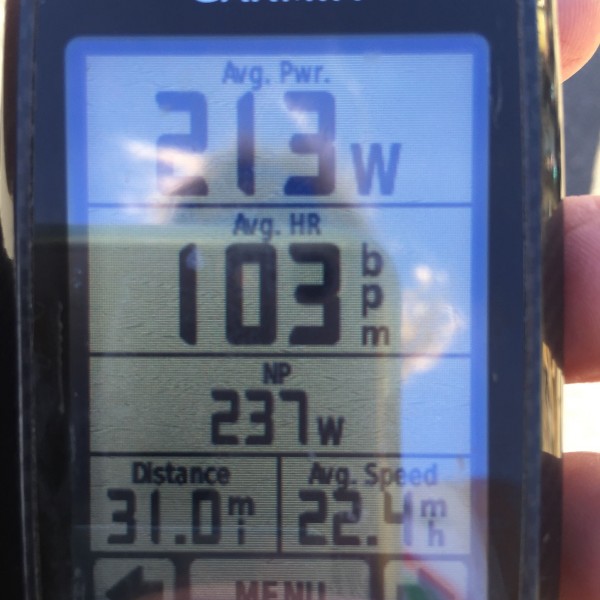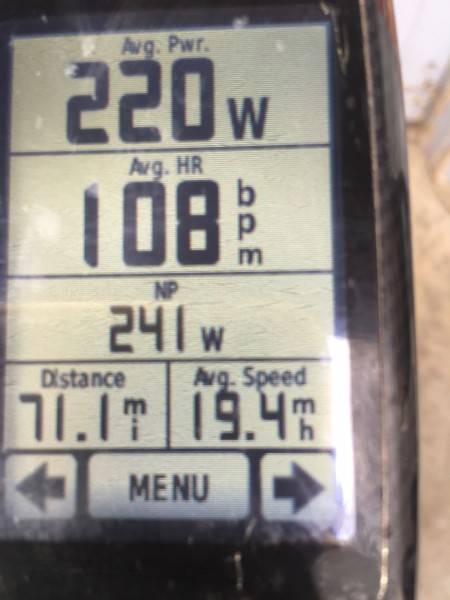Vincent gave me a strap to do heartrate last summer when I was training for Leadville. I was super surprised how low my heartrate was at altitude. I think my max heart rate during Leadville was in the mid 160’s, which is pretty low for me historically.
But historically, I haven’t looked at my heart rate for a couple decades, so it is all new data. Back when Polar first came out with heart rate monitors, I could see a max of over 190 on a bicycle every once in awhile and much higher if I was running or skiing.
My opinion is that your heart rate is higher the more muscle you are using. Like I said above, I rarely saw a heart rate of over 190 riding a bike, but I did a 10K and from 15 minute to 30 my heart rate was over 195 the whole time and I didn’t feel that stressed.
Anyway, back to present. I’ve been wearing my strap for the past couple weeks pretty consistently and am so surprised how low it is most of the time just riding along. Granted, I’ve not really been riding that hard, mainly because I have this lung thing going on and it hurts when I breath deeply or rapidly.
But it is still low. Last weekend I was doing a long-ish ride with some guys from Lawrence and going up a small hill into Lawrence, my heart rate was in the 140’s and a friend from Lawrence heart rate was 180. That is pretty extreme.
I let Bill use an extra strap, as I have a new Wahoo strap, and wanted to see if it read the same as a Garmin. Riding to Lawrence a couple days ago, Bill’s heart rate was consistently 20-30 beats higher.
I know each individual’s heart rate is personal and it isn’t really right to compare, but I’m comparing mine to my own.
And here’s the weird thing. Even though it seems like my high numbers are low, my low numbers are stupid low. Like when I’m sitting in the driveway before a ride, my pulse is sometimes in the 30’s. Never higher than the 40’s. And it drops into double digits when I’m coasting down a hill during a ride, which seems like 20 beats low.
So my high seems 20 beats lower, but my low is 20 beats lower. So that is the question. I sort of understand max heart rates decreasing with age, but it seems I still have the same range during exertion, it is just 20 beats lower at the top and the bottom. I did go hard last month on the trainer and got my high up to 180, which was a relief. Maybe when I’m racing the next couple weeks, and am doing some max efforts, I’ll have more data to go on.
Anyone out there with any ideas?

Garmin at Lawrence about 1/2 way through the ride yesterday. I had a 20 mph tailwind and was riding super easy.







Keep the pictures of Tucker coming . . . Really cute puppy.
Oh boy. Here come the “doctors”.
Couple things come to mind:
1) heart rate strap needs a new battery or is not positioned correctly/something is interfering with the reading on your body so you’re getting inaccurate readings. Maybe you just need a new strap.
2) a conspicuous lack of adequate recovery time, which may or may not be an issue, but will become more of an issue with advancing age. If the strap battery/positioning isn’t the reason, an appointment for a consultation with a cardiologist might be an option, someone who specializes in sports medicine. If for no other reason to give you one less thing to be concerned about.
I always thought highly trained individuals had lower HR’s.
However, it could be this: https://www.sciencenews.org/blog/scicurious/slow-heartbeat-athletes-not-so-funny
This is an interesting article: http://velonews.competitor.com/2009/05/news/autopsy-shows-steve-larsen-did-not-die-of-a-heart-attack_92268
I think you need to use it consistantly over a period of time to develope some baseline before assuming anything is a miss.
Age 25 vs 50 plus and max is down 10bpm. Zones down 4-6bpm. Resting same in low 40s.
I agree that activities that include upper body seem to produce a higher hr w less preceived effort. Rowing & xc sking in my case.
U r in a great shape. Ride on!
I am about the same age (1960 vintage) and have competed and trained in cycling albeit at not quite the same level. Done Leadville though! My experience mirrors what you are seeing. Resting low 40s max mid 170s. In my 20s it wasnt a hard effort until saw 190+. Likely a better indicator would be power versus heart rate
My experience mirrors yours.
My max was never as high but in years gone by I was on a great TT ride if I averaged 174-175.
It was a average ride if I saw an average of 172-173.
If I was below 172, the TT was going to suck.
Fast forward 20 years and 160-162 is about the max I will ever see.
Additionally my resting HR, like yours, has become stupid low.
I am chalking it up to age.
Guessing the same for you.
No wise HR opinion from this quarter, but I do remember when those clunky Polars HR monitors came out, and you and the team got them. Then it became a video game of max numbers all the time.
Yes: we call this an e-pen
Steve:
Too many people focus on how high they can get their heart rate up. Actually, if you convert your body to burn fat efficiently you can race/ train at a higher intensity at a lower heart rate. I bet your resting pulse is pretty low too.
“convert your body to burn fat efficiently ”
Can you explain further?
Maximal HR declines with age. The standard formula for maximal HR (beats/minute) is 220 minus your age in years. In athletes, age-predicted maximal heart rate is more like 208 minus (0.7 x age) (source: Tanaka, Am Coll Cardiol 2001). Derek Clayton from New Zealand (who ran a marathon in 1969 in 2:08:33.6, which stood as the world best for almost 12 years) was a good example of someone who continued hard training over a long period. His values in 1970 (age 28 yr) were: weight = 73.1 kg, VO2max = 5.09 L/min, HRmax= 188 beats per minute. Twenty-two years later (age 50 yr) his values were: weight = 75.2 kg, VO2max = 5.13 L/min, and HRmax= 176 beats per minute. So, a decline of only 12 beats per minute in 22 years!!
This is the resource: http://www.amazon.com/Art-Science-Low-Carbohydrate-Performance/dp/0983490716/ref=sr_1_2?s=books&ie=UTF8&qid=1456156043&sr=1-2&keywords=phinney+and+volek
I believe Steve was one of the study participants. Kind of old data. My doctor has been advocating that I do this, but going to a sub 50 gram carb diet is difficult when racing.
Your heart has become super efficient and much larger. My last stroke sends the EKG reader off the top of the chart. Usually they are concerned my enlarged heart was caused by health problems until I explain the excercise. Some do have trouble when they quit the sport, but I have no real info on that.